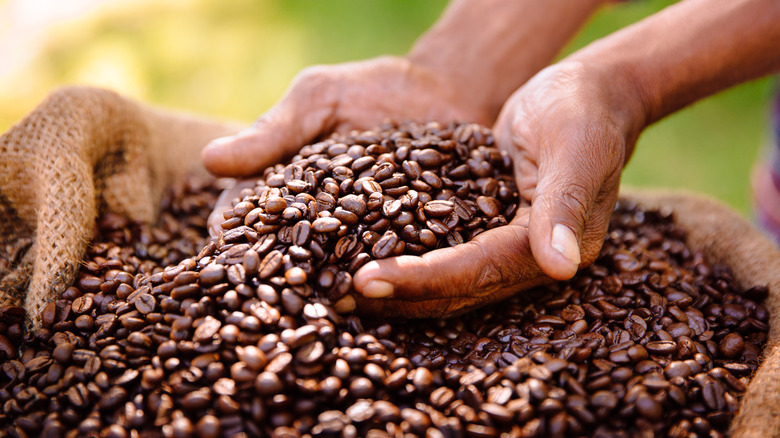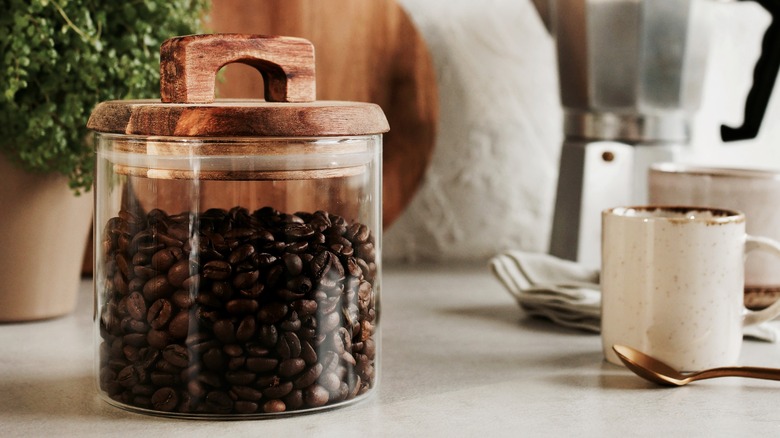Do Coffee Beans Expire?
There are certain telltale signs of expired foods: You'll see fuzzy mold growing, smell a foul stench, or notice firm foods turning squishy due to rot. But dry goods like coffee beans don't really fit that bill, so you might wonder: Will your expensive beans ever expire? The answer is that they do, but it can be hard to tell. Expired coffee beans don't usually rot or get moldy, and they probably won't make you ill if you brew and drink them. However, the quality of the beans will drastically deteriorate with time.
Coffee beans get their flavor and aroma from natural oils, and these oils began to oxidize after they come into contact with air. They can then turn rancid when exposed to heat and sunlight, which produces a foul taste, but even without these factors, the beans' flavor will gradually weaken. Additionally, coffee beans contain lipids, carbohydrates, and amino acids that also break down over time, and further contribute to the deteriorating flavor. You'll notice the intensity of your java waning until you're left with stale and insipid coffee, at best.
Generally speaking, a pack of unopened, whole coffee beans will retain its freshness for about a year. Once opened, you might notice a drop in quality in as little as a week. Though they'll still be fine to use for up to six months, your cups of joe might leave much to be desired.
Coffee's shelf life depends on several factors
While there are guidelines you can follow for best storage practices, many factors affect the ultimate shelf life of coffee beans. For one, consider how long the beans have been roasted for. Dark beans are roasted for longer, which draws out more oils, so they'll deteriorate faster. On the flip side, the flavor of lightly roasted beans can stay intact even a month after they're opened, if you're lucky.
Another factor to consider is whether the beans are whole or ground, and the grind size itself. Coffee beans are at their best when whole and freshly-roasted. After roasting, the beans contain gasses such as carbon dioxide that are released in a process called degassing. This surrounds the coffee with CO₂ that protects it from oxygen for a few days. Grinding breaks open the beans, creating consequences for flavor and exposing it oxidization. The smaller particles also have an increased surface area that ups oxygen exposure and decay. The finer the grounds are, the quicker they will spoil.
Unopened bags of pre-ground coffee typically stay fresh for a year, but once that seal is broken, it's a race against time. The grounds will be at their freshest for a week or so, after which their quality will diminish until they turn stale three to five months later. Consider buying whole beans and grinding them at home for a better cup — after all, it's possible to grind coffee without a fancy grinder.
How to preserve the freshness of coffee beans
As with any ingredient, the shelf life of your coffee beans also depends on how well they are stored. The key is to keep the beans away from air, sunlight, heat, and moisture, opting for a cool, dry, and dark environment instead. Once opened, transfer your beans to an airtight container, preferably a dark and opaque one made of ceramic, glass, or metal to shut out light and air. Stay away from containers made of plastic, as these are porous enough to allow oxygen to penetrate through — it's a food storage mistake you need to stop making.
Coffee beans can also be frozen to keep them fresh for six months, but make sure to transfer them to airtight containers that will prevent freezer burn. However, while freezers are okay, refrigerators are not — this appliance can create rare situations in which the beans get moldy. Refrigeration will subject the coffee to moisture, as the frequent temperature changes inside the fridge can cause condensation to build up in the container. You'll wind up with musty-tasting or even moldy beans.
Even if you've followed the checklist to keep coffee beans fresh for as long as possible, they will still go stale at some point. Always take a close look at your beans, smell them, and feel them to determine their freshness. Coffee beans that don't have a distinct smell, have a dry and lackluster appearance, or feel too brittle are past their prime.



